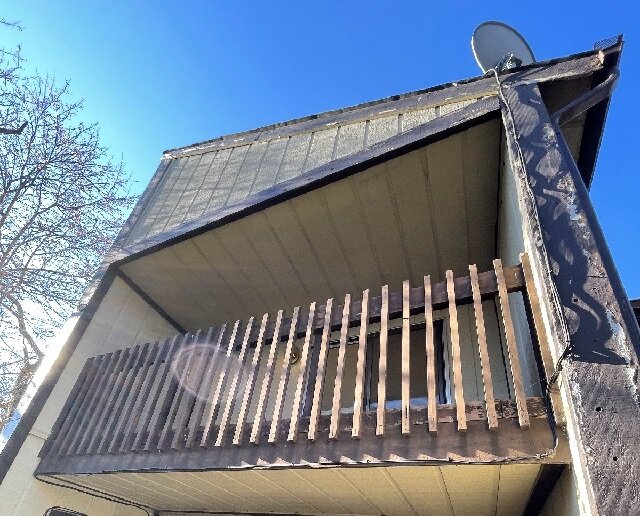Inheriting a house — while a generous gift from a loved one — kicks off a process that can be fraught with emotion.
You’re likely receiving this property as a result of a loved one’s death, and the financial decisions that come with inheriting property can be stressful and confusing.

The best way to move forward is knowing your options, assessing the financial consequences of your choice, and seeking expert assistance in navigating the tax and legal requirements. (1)
This guide will provide you with the relevant information you need to sell your inherited house quickly.
Know Where the Mortgage Stands
As the new owner of the house, you must be completely aware of the status of the mortgage.
A title search will disclose any liens or judgments related to the property, such as unpaid tariffs, a home equity line of credit, or a reverse mortgage.
Every house has a title, and the title contains important information about the home, such as the liens it has.
A lien is a legal mechanism used by lenders to secure their interest in a property. Contractors and others can lay liens on homes if the owner owes them money.
If a residence has liens, the homeowner typically pays them when selling the property.
As a result, you may want to begin the process by looking into the home’s title to see whether there are any liens.
You may find that the relative who handed you the house still owes money on it.
You might also locate other liens during your search. You are responsible for the liens if you sell your home to a traditional buyer.
You can find cash home buyers in Louisville if you don’t want to pay the liens. Cash house buyers usually pay the liens themselves.
You can look into this by doing a title search. You may need to pay a lawyer or a title company to finish this stage, but it is necessary before advancing.
Time is of the essence when it comes to mortgage issues, so contact the mortgage company and any owed creditors as soon as you have the necessary documentation proving that you are the executor or trustee.
Foretell Your Ownership Timeline

Even if you know you’ll inherit the property; it may be some years before you can legally possess it.
The timetable for ownership is determined by how you acquired the residence, whether through probate, transfer on death (also known as a beneficiary deed), or living trust.
If you inherited the property through a living trust or life estate deed, you will be able to take ownership as soon as possible.
Because no judicial clearance is required, you can sell the property now or at any time.
Probate inheritance is more difficult and takes longer. Remember that most states require a legal process, which can take anything from a week to six months.
To acquire a general schedule, ask your probate attorney and estate administrator when the probate process is expected to be completed so you can plan accordingly.
Coordinate with all Heirs to Name a Personal Representative

Before you begin selling the house you inherited, you must identify all of the inheritors and the named executor or personal representative.
The executor will have the ultimate say on house decisions and will preserve and safeguard the property until the sale date.
If the deceased’s will does not specify an executor, all heirs must designate a personal representative.
Typically, this is the individual in the family who is emotionally and practically prepared to handle the sale.
Judges want someone who will follow his or her job and then follow the letter of the law when it comes to accounting, paperwork, and the proper distribution of estate monies.
Obtain the Assistance of a Mediator if Needed
There is plenty of drama that may arise when there are numerous heirs. If your family is having difficulty reaching an agreement on the sale of your property, consider hiring a mediator to assist you in overcoming the difficulties.
If the beneficiaries cannot agree on the sale of the house or other matters related to the house — renovations, the agent, evicting tenants, etc. — a mediator can assist in resolving these issues outside of a formal judicial process.
This can help reduce the time spent on resolution and cost.
The most common reason for hiring a mediator is when one heir refuses to sell — generally for emotional reasons — or wants to negotiate for more money.
Consult Your Tax Expert About Potential Tax Liability

Next, consult your tax professional about the potential tax ramifications of inheriting and selling a home.
Typically, if you inherit a property, you will not have to pay taxes on it until you sell it. You may be liable for the following tax obligations when selling your home.
Inheritance Tariff
This is a tax on the transfer of property from a deceased individual to their heirs.
The tax rate varies according to the value of the home and the relationship between the deceased and their heirs. It’s vital to remember that the inheritance tax is owed within nine months following the decedent’s death.
Interest and penalties will apply if the tax is not paid within that time range.
Notably, you will not be obliged to pay inheritance tax if the deceased transferred ownership of the home to you at least two years before their death.
Capital Gains Tax
You can be subject to both the inheritance tax and federal capital gains taxes when you sell an inherited home.
These taxes are calculated by the difference between the property’s selling price and its “basis,” which is the home’s valuation at the time of the original owner’s death.
For example, if the home’s fair market value at the time of the decedent’s death was $300,000 and you sold it for $350,000, you must pay capital gains tax on the $50,000 difference.
However, if you sell the home soon after inheriting it and the property’s value has not increased or dropped, you will not have to pay capital gains taxes.
Capital gains taxes on inherited property may also be subject to specific deductions and exclusions.
For example, if you move into the inherited home and decide to sell it after two years, you may be entitled to a capital gains tax exemption of up to $250,000. It may also be $500,000 if married and filing jointly.
Income Tax
If you decide to rent out a home after inheriting it and are considering selling it, you must pay income tax on the rent you receive.
You should consider consulting with a tax professional before selling your inherited house to confirm that you have met all of your tax requirements.
Spruce up the Property, But Don’t Renovate

Let’s imagine you inherited a house with 1970s shag carpet and popcorn ceilings. You should concentrate on little cosmetic improvements rather than whole-room makeovers.
Check online to discover what renovations are suggested to boost the property’s value and marketability. An expert agent can also inform you which repairs you can avoid.
With just $2,000, you can turn the property around, clean it up (steam cleaning, painting), take the time to appreciate the asset, and ensure that you receive as much profit from the sale as possible.
Here are some examples of simple, high-impact projects that can help you sell my house fast Louisville:
- Improve curb appeal with professionally manicured grass, new compost, and a fresh coat of paint on the front door.
- Replace old carpeting and linoleum with vinyl wood flooring.
- Remove window valances, imitation plants, chair covers, and other out-of-date elements.
- Paint the walls in the main shared living spaces a bright, neutral color.
Determine the Value of the Inherited Property

If you’re just beginning and want to get a quick estimate of the property’s value, there’s no harm in using an online real estate value calculator—they’re usually quick and simple to use.
However, these predictions might vary substantially and are not applicable to tax or other legal purposes. You will need to conduct additional research to ascertain the property’s true value.
Begin by requesting recent tax assessment data from the county clerk’s office.
While assessments that haven’t been updated in years can’t help you establish the property’s value, the IRS enables heirs to use the home’s appraised value on the date of the owner’s death as the cost basis.
Even if the tax valuation is low, you and any other heirs will have to pay a larger capital gains tax when you sell the property.
Moreover, a professional evaluation completed by a licensed real estate appraiser provides the most credible and legally defensible estimate.
The appraiser can establish the home’s value when you and the other inheritors inherited it and its current value.
If you and the other heirs have owned the home for a long time, its value may have changed dramatically.
You will also need an appraisal if you inherited commercial or income-producing residential property, such as a duplex or apartment building.
Consider Selling Your Inherited House for Cash

Selling an inherited home on the market takes substantial time and effort.
And until the property sells, heirs are responsible for monthly mortgage payments, property taxes, and utility costs.
If you want to sell the inherited house quickly, consider selling it to a we buy houses Shelbyville organization right now.
While selling for cash may result in a lower profit, it can be faster, easier, and less demanding than selling a house on the market – a significant advantage if you’re feeling overwhelmed by the home sale process.
Below are the merits of selling your inherited house for cash.
No Repairs or Renovations Required
Many people find it extremely reassuring to be able to sell an inherited house without having to make repairs or improvements.
Inherited properties can have a variety of maintenance difficulties or are just antiquated, necessitating major time and financial expenses to make them marketable.
However, when selling to a cash buyer, the necessity for extensive repairs or improvements is significantly reduced.
Cash buyers are eager to buy homes in their current condition, which saves sellers the difficulty, cost, and time associated with property renovation.
This simplifies the selling procedure and ensures that the home may be sold fast and without the added burden of resolving physical flaws.
It enables vendors to quickly convert their inherited property into cash without the laborious and often overwhelming chore of dealing with property repairs, making it an especially enticing alternative for people looking for a hassle-free and quick way to liquidate their inherited assets.
Enjoy a Prompt Sale

Another primary benefit of a we buy houses Louisville, KY firm is the speed and convenience it provides.
Traditional real estate deals typically take many months to complete, including inspections, negotiations, and financing.
On the other hand, cash purchasers are usually eager to complete the transaction as soon as possible, generally within a few days or weeks. This is especially useful if you need to quickly access the sale proceeds.
It is also helpful if you’re selling an inherited property with multiple flaws.
No Financing Contingencies
Traditional buyers frequently use mortgage financing to purchase property, which adds uncertainty to the deal.
Financing contingencies can cause transactions to fall through if the buyer’s loan application is denied or delayed.
Conversely, cash buyers have the funds readily available, reducing this danger and providing a smoother, more secure transaction.
Avoid Real Estate Commissions and Fees
Selling an inherited property to a cash buyer saves you money on real estate commissions and fees.
Traditional real estate transactions usually involve real estate agents who charge commissions ranging from 5% to 6% of the sale price. Furthermore, there are various closing costs, like title insurance, attorney fees, and transfer taxes.
This can further reduce the earnings from the sale.
You can completely avoid these charges when you choose to sell to a cash buyer.
Cash purchasers are often investors or people wishing to buy properties directly, eliminating the need for real estate brokers and minimizing closing fees.
This permits you to retain a larger share of the sale price, maximizing your financial return on the inherited property.
By avoiding these commissions and fees, you can maximize the value of your inheritance and distribute the cash as you see fit, whether for additional investments, debt repayment, or simply creating financial security for yourself and your family.
Selling to a cash buyer might be an appealing and cost-effective solution for people seeking to realize the potential of inherited property without incurring the financial costs associated with standard real estate transactions.
Preservation of Privacy
Selling an inherited home through traditional channels frequently necessitates several showings and open houses, which can intrude and disturb your privacy.
Cash purchasers often do not require these public showings, allowing you to maintain your confidentiality and remove your personal life from the transaction.
Avoiding Holding Costs
Home taxes, insurance, upkeep, and utilities are just a few of the recurring expenses associated with owning an inherited home.
These expenditures can accumulate over time, particularly if the home remains unoccupied. Selling for cash means you can get rid of these financial obligations and save money in the long term.
Minimal Paperwork and Procedures

Selling your inherited home to a cash buyer provides the considerable benefit of minimizing bureaucracy and paperwork.
Traditional real estate purchases frequently include a complex network of legal documents, inspections, and regulatory regulations, which can be overwhelming and time-consuming.
On the other hand, cash purchasers expedite the process by eliminating paperwork and making the transaction easier to understand.
With fewer governmental barriers to traverse, the transaction can proceed more quickly and with less risk of errors or issues, making it an appealing alternative for individuals seeking a straightforward and fast way to sell their inherited homes.
Study the Offer and Respond to It
Finally, when you receive a cash offer, consider all the information in the offer as you evaluate it.
The sum will be less than if you remodel the house and sell it, but a cash sale has other advantages.
There will be no hard feelings if you decide not to sell the house. You will just tell the cash buyer that you do not want to sell it.
However, if you are ready to accept the offer, let them know, and they will begin the paperwork. You’ll obtain your check from the sale faster if you notify them right away.
Close the Sale
The final stage in selling an inherited house is the closing process. Here, three major things will happen:
The buyer will pay for the house in full, and you will transfer ownership to them. You will then sign a purchase agreement (which is not the same as a PSA) to complete the transaction.
As the home seller, you are responsible for paying off any existing debts or liens on the property, transfer taxes, and other closing costs related to the sale.
The house sale may not go through if you are unable to pay off any obligations secured by liens on the property.
However, if you sell to a cash buyer, you won’t need to pay off existing debts, liens, or closing costs.
This is because the buyer will pay for all these costs and give you the rest of the proceeds from the sale.
